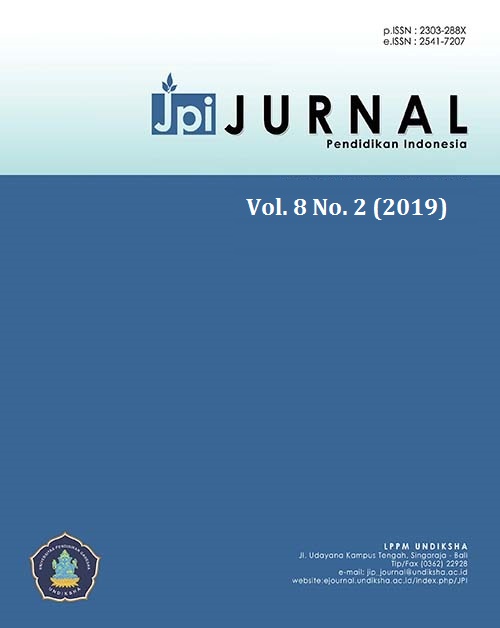The Effect of Everyone is a Teacher Here Model and Self-Regulated Learning Towards Learning Outcomes of Indonesian History
DOI:
https://doi.org/10.23887/jpi-undiksha.v8i2.17577Keywords:
Everyone Is a Teacher Here, Self-Regulated Learning, Learning OutcomesAbstract
This research aimed at finding the influence of the learning model Everyone Is a Teacher Here and Self-Regulated Learning towards of Learning Outcomes of Indonesia History. The research was conducted at SMAN 8 Tangerang on the academic year 2017/2018. The research method was experiment, with treatment by level 2X2. Results showed that the students who were treated with the Everyone Is a Teacher Here model had high learning outcomes, compared to those who were given direct model learning; groups of students who had high self-regulated learning and they received learning Everyone Is a Teacher Here had a higher learning outcomes in Indonesian history compared to those given direct learning; groups of students who had low Self-Regulated Learning and they received direct learning, haved higher learning outcomes in Indonesian history compared to those studied Everyone Is a Teacher Here; and, ultimately, there was an interaction effect between the learning model and the Self-Regulated Learning of the learning outcomes of Indonesian history.
References
Agustinawati, Nita. 2014. Pengaruh Metode Pembelajaran dan Kemandirian Belajar Terhadap Hasil Belajar Sejarah Siswa di SMAN 7 Cirebon. Jurnal Pendidikan Sejarah. Vol. 3 (2), 1-7.
Arzul, Radhiah., Zulfitri Aima dan Audra Pramitha Muslim. 2018. Pengaruh Penerapan Strategi Everyone Is A Teacher Here (Eth) Terhadap Kemandirian Dan Hasil Belajar Matematika Siswa Kelas VIII SMPN 12 Padang Tahun Pelajaran 2017/2018. Jurnal Ilmiah Mahasiswa. Diunduh dari: http://jim.stkip-pgri-sumbar.ac.id/jurnal/download/1396.
Basri, Hasan. 2001. Psikologi Pendidikan. Jakarta: Dunia Pustaka.
Burman, Jeremy T., Green, C. D., dan Shanker, S. 2015. On the Meanings of Self-Regulation: Digital Humanities in Service of Conceptual Clarity. Child Development. Vol. 86 (5), 1207-1221.
Chi, Michelene T. H. & Ruth Wylie. 2014. The ICAP Framework: Linking Cognitive Engagement to Active Learning Outcomes. Educational Psychologist, 49 (4), 219–243.
Edwards, Susan. 2015. “Active Learning in the Middle Grades”, Middle School Journal, Vol. 46 (5), 26-32.
Faust, J.L., & Paulson, D.R. 1998. “Active Learning in College Classroom”. Journal on Excellence in College Teaching, 9 (2), 3-24.
Fayombo, Grace. 2012. Active Learning Strategies and Student Learning Outcomes Among Some University Students in Barbados. Journal of Educational and Social Research, Special Issue, (2)9, 79-90.
Freeman et.al., .2014. “Active Learning Increases Student Performance in Science, Engineering, And Mathematics,” Proceedings of the National Academy of Sciences of the United States of America PNAS, Vol. 111 (23).
Hasan, Said Hamid. 2012. Guru Sejarah Indonesia Isu dalam Ide dan Pembelajaran. Bandung: Rizqi Press.
Hasan, Said Hamid. 2013. History Education in Curriculum 2013: A New Approach to Teaching History. Jurnal HISTORIA: International Journal of History Education. Vol. XIV (2), 163-178.
Hurlock, E. B. 2013. Psikologi Perkembangan. Jakarta: Erlangga.
Ismail. 2009. Strategi Pembelajaran Agama Berbasis PAIKEM. Semarang: Rasail Media Group.
Kochar, S.K. 2008. Pembelajaran Sejarah. Jakarta: Gramedia.
Michael, Joel. 2006 Where’s the Evidence That Active Learning Works? Advances in Physiology Education, The American Physiological Society, Vol. 30, 159-167.
Paulino, Paula., Isabela Sa, dan Adelina Lopes da Silva. 2016. Self-Regulation of Motivation: Contributing to Students’ Learning in Middle School. The European Proceedings of Social & Behavioural Science. 4th Annual International Conference on Cognitive – Social, and Behavioural Sciences.
Prince, Michael. 2004. “Does Active Learning Work? A Review of the Research”. Journal of Engineering Education. July, 223-231.
Rijal, Syamsu & Suhaedir Bachtiar. 2015. Hubungan Antara Sikap, Kemandirian Belajar, dan Gaya Belajar dengan Hasil Belajar Kognitif Siswa. Jurnal Bioedukatika, Vol 3(2), 15-20.
Rohmawati, Ina dan Eli Rohaeti. 2015. Pengaruh Penerapan Strategi Everyone Is A Teacher Here Terhadap Kemandirian Dan Prestasi Belajar Kimia. Diunduh dari: http://journal.student.uny.ac.id/ojs/index.php/pkimia/article/download/3787/3404.
Said, Muhammad Amin., Nirmayanti, Nurlina. 2015. Penerapan Pembelajaran Aktif Tipe Everyone Is A Teacher Here (ETH) Untuk Meningkatkan Hasil belajar Fisika Peserta Didik Kelas XA SMA Al Bayan Makassar. Prosiding Seminar Nasional Fisika (E-Journal) Vol. IV, Oktober, 2015.
Schraw, Gregory., Kent J. Crippen, dan Kendall Hartley. 2006. Promoting Self-Regulation in Science Education: Metacognition as Part of a Broader Perspective on Learning. Research in Science Education, Vol. 36, 111-139.
Silberman, Melvin L. 2009. Active Learning: 101 Strategi Pembelajaran Aktif. Yogyakarta: Yappendis.
Sirinterlikci, Arif., Linda Zande dan Aleea L. Sirinterlikci, 2009. “Active Learning Trough Toy Design and Development”, The Journal of Technology Studies, Vol. 35(8): 14-22.
Slavin, Robert E. 2011. Psikologi Pendidikan Teori dan Praktik. Jakarta: Indeks.
Sulaiman. 2016. Pengaruh Strategi Everyone Is A Teacher Here Terhadap Hasil Belajar Matematika Siswa. Jurnal E-Dumath. Vol. 2(1), 152-160.
Sumantri, M.S. & Rachmadtullah, Reza. 2016. The Effect of Learning Media and Self Regulation to Elementary Students’ History Learning Outcome. Advanced Science Letters. Vol. 22(12), 4104-4108.
Susanto, Heri. 2014. Seputar Pembelajaran Sejarah (Isu, Gagasan, dan Strategi Pembelajaran). Yogyakarta: Aswaja.
Zaini, Hisyam., Bermawy Munthe, dan Sekar Ayu Aryani. 2008. Strategi Pembelajaran Aktif. Yoyakarta: Pustaka Insan Madani dan CTSD UIN Sunan Kalijaga.
Zimmerman, Barry J. 1990. Self-Regulated Learning and Academic Achievement: An Overview. Educational Psychologist. Vol. 25, 3-17.
Downloads
Published
Issue
Section
License
Authors who publish with the Jurnal Pendidikan Indnesia agree to the following terms:
- Authors retain copyright and grant the journal the right of first publication with the work simultaneously licensed under a Creative Commons Attribution License (CC BY-SA 4.0) that allows others to share the work with an acknowledgment of the work's authorship and initial publication in this journal.
- Authors are able to enter into separate, additional contractual arrangements for the non-exclusive distribution of the journal's published version of the work (e.g., post it to an institutional repository or publish it in a book), with an acknowledgment of its initial publication in this journal.
- Authors are permitted and encouraged to post their work online (e.g., in institutional repositories or on their website) prior to and during the submission process, as it can lead to productive exchanges, as well as earlier and greater citation of published work. (See The Effect of Open Access)








